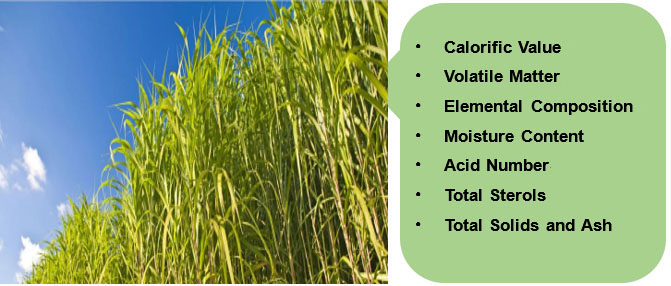As the world continues to deplete its nonrenewable resources, there has begun a shift toward using renewable materials for the production of fuels. Biomass has extreme potential to be used for production of renewable energy such as biogas, ethanol, and biodiesel or burned directly to produce heat. Biomass refers to plant or animal material not used for food or feed, which can be purposely grown energy crops, wood or forest residues, waste from food crops, horticulture, food processing, animal farming, or human waste from sewage plants. The components of biomass can affect the conversion of biomass to bioenergy, as well as it cannot be optimized when its features are not measured clearly. Therefore, it is a key element to figure out the comprehensive characteristics of biomass for users to maximize their value in the bioenergy field. At the same time, the biomass compositional analysis results could improve our understanding of the economics and environmental impacts of biomass conversion process.
Lifeasible is a leading company in bioenergy testing, can provide customers worldwide with standard biomass analysis services for a variety of biomass composition properties determination, which include, but not limited to:
 Figure 1. Biomass compositional analysis
Figure 1. Biomass compositional analysis
These biomass components can influence the biomass conversion process. For example, high ash content generally has a negative effect on biomass conversion across the board by reducing the efficiency of dilute acid pretreatment for biological process and increasing char yields and fouling in the thermochemical processes such as hydrothermal liquefaction (HTL), pyrolysis, and combustion. Volatiles are generally represented by light organic acids, such as acetic acid, and furans. The furan fraction of the volatiles can reduce fermentation efficiency in biological process and lower energy content and stability in bio-oils produced by thermochemical processes. Lignin generally has a negative effect on ethanol production by blocking enzyme access to cellulose but can increase oil yields for pyrolysis and heating values for combustion during thermochemical conversion.
Our biomass compositional analysis laboratory is equipped with a number of state-of-the-art equipments, such as HPLC with various detectors, UHPLC, LC/QTOF MS, LC/ion trap MS, UV/Vis spectrometers, GC/FID, GC/quadrupole MS, NIR spectrometers, etc. Moreover, we can help our clients understand detailed and accurate characterization of the chemical composition from raw biomass feedstock, intermediates, to finished products. For more information, please feel free to contact us.